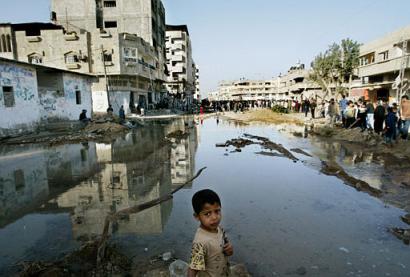 These heartless words from the government of Israel came earlier this year; anyone glancing at the news will know that the situation in Gaza is now profoundly worse than it was in January, when Hamas was democratically elected to office. A series of events since then have created a profound humanitarian crisis throughout Gaza.
These heartless words from the government of Israel came earlier this year; anyone glancing at the news will know that the situation in Gaza is now profoundly worse than it was in January, when Hamas was democratically elected to office. A series of events since then have created a profound humanitarian crisis throughout Gaza.In his most recent op-ed, the ever reliable Alexander Cockburn describes the desperate situation. He writes, "Israel has kept shut the Karni (al-Muntar) industrial crossing into the Gaza Strip for weeks at a time, locking out medicines, food and goods... affecting the lives of at least 700,000 people. Doctors, nurses, teachers, civil servants, policemen and others return home empty-handed each day to families whose overall levels of poverty and malnutrition have grown dramatically. Save the Children UK Program Manager Jan Coffey reports that in Gaza now 78 percent of the population lives below the poverty line ($2 per day) and that 10 percent of children under five suffer from chronic malnutrition."
 Clearly Hamas has not improved this situation with its violent stance against the occupier. Though their leadership oscillates daily about whether or not to acknowledge Israel's right to exist, they are adamant in their demand that Israel recognise their own right to exist. This demand extends to the international community, which has responded with economic sanctions and silence in the face of devastating violence against civilians. By association, the entire world appears to have turned its back on Gaza, leaving them to perish from sheer negligence. Ehud Olmert's statement before a joint session of the US Congress a few weeks ago, in which he stated that he believes "in our people's eternal and historic right to this entire land," was met by applause and an outpouring of financial gifts, therefore aligning our government on the side of -dare I write it?- manifest destiny.
Clearly Hamas has not improved this situation with its violent stance against the occupier. Though their leadership oscillates daily about whether or not to acknowledge Israel's right to exist, they are adamant in their demand that Israel recognise their own right to exist. This demand extends to the international community, which has responded with economic sanctions and silence in the face of devastating violence against civilians. By association, the entire world appears to have turned its back on Gaza, leaving them to perish from sheer negligence. Ehud Olmert's statement before a joint session of the US Congress a few weeks ago, in which he stated that he believes "in our people's eternal and historic right to this entire land," was met by applause and an outpouring of financial gifts, therefore aligning our government on the side of -dare I write it?- manifest destiny.Around the same time as this proclamation of intent -Olmert as much as announced his intention to eradicate the Palestinian population- the World Bank published a report in which the economic outlook for the occupied Palestinian Territories is assumed based on a scenario in which tax revenues to the Palestinian Authority are withheld, trade and labor restrictions are imposed and foreign aid reduced. Under this scenario, "real GDP per capita declines by 27 percent, and personal incomes by 30 percent -a one year contraction of economic activity equivalent to a deep depression. Unemployment hits 47 percent and poverty 74 percent by 2008."
Sadly this is no longer a scenario: it is happening in Gaza as you read this.
 The growing crisis is also the subject of a press release last month from the International Committee of the Red Cross: The ICRC is deeply concerned about the growing needs and the worsening security situation in the occupied territories, caused in large part by the decision earlier this year to withhold funds and other aid from the PA. The occupying power -in this case the State of Israel- is responsible for meeting the basic needs of the civilian population of the territory it occupies. Those needs include sufficient food, medical supplies and means of shelter."
The growing crisis is also the subject of a press release last month from the International Committee of the Red Cross: The ICRC is deeply concerned about the growing needs and the worsening security situation in the occupied territories, caused in large part by the decision earlier this year to withhold funds and other aid from the PA. The occupying power -in this case the State of Israel- is responsible for meeting the basic needs of the civilian population of the territory it occupies. Those needs include sufficient food, medical supplies and means of shelter."
No comments:
Post a Comment